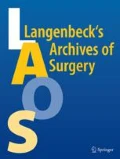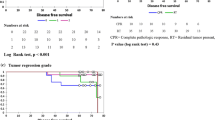Abstract
Introduction
Randomized trials have demonstrated a reduction in local recurrence rate in rectal cancer patients treated with preoperative chemoradiotherapy and total mesorectal excision (TME) compared to patients undergoing TME alone. Accordingly, preoperative chemoradiotherapy in all UICC stages II and III rectal cancers has been recommended in the German treatment guidelines as of 2004. However, this policy has been questioned in recent years, partly due to concern regarding an increase in postoperative complications through preoperative therapy. Studies on this issue are sparse; most have been conducted in specialized centers, included relatively few patients, and yielded partly contradicting results. It was the aim of our analysis to investigate the influence of preoperative chemoradiotherapy on anastomotic leak rate and postoperative bladder dysfunction in rectal cancer patients using a representative data set from the Quality Assurance in Rectal Cancer Surgery multicenter observational trial.
Method
This is a retrospective analysis of data from the Quality Assurance in Rectal Cancer Surgery prospective multicenter observational trial. Data of all patients undergoing curatively intended sphincter-preserving resection for UICC stage I through III rectal carcinoma between 01 Jan 2005 and 31 Dec 2007 with or without preoperative chemoradiotherapy (groups A and B, respectively) were included. Multivariate statistical analysis using propensity score analysis was carried out regarding outcome parameters total anastomotic leak rate, rate of anastomotic leaks requiring reoperation, and postoperative bladder dysfunction.
Results
A total of 2,085 patients were included (group A, n = 676, group B, n = 1,409). Significant differences were present between groups regarding age, sex, distance of the tumor from the anal verge, pT-stage, UICC stage, hepatic risk factors, and use of protective enterostomy by univariate analysis. Multivariate logistic regression including these parameters was used to calculate the propensity score (likelihood to be assigned to group A or B as a consequence of the individual profile of these factors) for each patient. When outcome parameters were compared between groups A and B after stratification for propensity score, no significant differences regarding postoperative bladder dysfunction (p = 0.12), total anastomotic leak rate (p = 0.56), and anastomotic leaks requiring reoperation (p = 0.56) could be demonstrated.
Conclusion
Neoadjuvant chemoradiotherapy for rectal carcinoma does not increase the risk for anastomotic leakage or postoperative bladder dysfunction after curatively intended sphincter-preserving rectal resection.
Similar content being viewed by others
References
Stockholm Rectal Cancer Study Group (1990) Preoperative short-term radiation therapy in operable rectal carcinoma. A prospective randomized trial. Cancer 66:49–55
Stockholm Colorectal Cancer Study Group (1996) Randomized study on preoperative radiotherapy in rectal carcinoma. Ann Surg Oncol 3:423–430
Swedish Rectal Cancer Trial (1996) Local recurrence rate in a randomised multicentre trial of preoperative radiotherapy compared with operation alone in resectable rectal carcinoma. Eur J Surg 162:397–402
Colorectal cancer collaborative group (2001) Adjuvant radiotherapy for rectal cancer: a systematic overview of 8, 507 patients from 22 randomised trials. Lancet 358:1291–1304
Cammà C, Giunta M, Fiorica F, Pagliaro L, Craxì A, Cottone M (2000) Preoperative radiotherapy for resectable rectal cancer: a meta-analysis. JAMA 284:1008–1015
Kapiteijn E, Marijnen CA, Nagtegaal ID, Putter H, Steup WH, Wiggers T, Rutten HJ, Pahlman L, Glimelius B, van Krieken JH, Leer JW, van de Velde CJ (2001) Preoperative radiotherapy combined with total mesorectal excision for resectable rectal cancer. N Engl J Med 345:638–646
Sauer R, Becker H, Hohenberger W, Rödel C, Wittekind C, Fietkau R, Martus P, Tschmelitsch J, Hager E, Hess CF, Karstens J, Liersch T, Schmidberger H, Raab R (2004) Preoperative versus postoperative chemoradiotherapy for rectal cancer. N Engl J Med 351:1731–1740
Schmiegel W, Reinacher-Schick A, Arnold D, Graeven U, Heinemann V, Porschen R, Riemann J, Rödel C, Sauer R, Wieser M, Schmitt W, Schmoll H, Seufferlein T, Kopp I, Pox C (2008) Update S3-guideline “colorectal cancer” 2008. Z Gastroenterol 46:799–840
Ulrich A, Schwerdt J, Z’graggen K, Kienle P, Weitz J, Büchler MW (2007) Acceptance of neoadjuvant short-term radiotherapy: a survey under surgeons and radiotherapists. Langenbecks Arch Surg 392:525–533
Junginger T, Hermanek P, Oberholzer K, Schmidberger H (2006) Rectal carcinoma: is too much neoadjuvant therapy performed? Proposals for a more selective MRI based indication. Zentralbl Chir 131:275–284
Ulrich A, Weitz J, Büchler MW (2009) Rectal cancer. How much radiotherapy do surgery patients need? Chirurg 80:266–273
Birgisson H, Påhlman L, Gunnarsson U, Glimelius B (2005) Occurrence of second cancers in patients treated with radiotherapy for rectal cancer. J Clin Oncol 23:6126–6131
Pollack J, Holm T, Cedermark B, Altman D, Holmström B, Glimelius B, Mellgren A (2006) Late adverse effects of short-course preoperative radiotherapy in rectal cancer. Br J Surg 93:1519–1525
Marijnen CA, Nagtegaal ID, Kapiteijn E, Kranenbarg EK, Nordijk EM, van Krieken JH, van de Velde CJ, Leer JW, Cooperative investigators of the Dutch Colorectal Cancer Group (2003) Radiotherapy does not compensate for positive resection margins in rectal cancer patients: report of a multicenter randomized trial. Int J Radiat Oncol Biol Phys 55:1311–1320
Peeters KCMJ, van de Velde CJH, Leer JWH, Martijn H, Junggeburt JMC, Kranenbarg EK, Steup WH, Wiggers T, Rutten HJ, Marijnen CAM (2005) Late side effects of short-course preoperative radiotherapy combined with total mesorectal excision for rectal cancer: increased bowel dysfunction in irradiated patients—a Dutch colorectal cancer group study. J Clin Oncol 23:6199–6206
Marijnen CAM, Kapiteijn E, van de Velde CJH, Martijn H, Steup WH, Wiggers T, Kranenbarg EK, Leer JWH (2002) Acute side effects and complications after short-term preoperative radiotherapy combined with total mesorectal excision in primary rectal cancer: report of a multicenter randomized trial. J Clin Oncol 20:817–825
Akiyoshi T, Kuroyanagi H, Oya M, Konishi T, Fukuda M, Fujimoto Y, Ueno M, Yamaguchi T, Muto T (2009) Safety of laparoscopic total mesorectal excision for low rectal cancer with preoperative chemoradiation therapy. J Gastrointest Surg 13:521–525
Horisberger K, Hofheinz RD, Palma P, Volkert AK, Rothenhoefer S, Wenz F, Hochhaus A, Post S, Willeke F (2008) Tumor response to neoadjuvant chemoradiation in rectal cancer: predictor for surgical morbidity? Int J Colorectal Dis 23:257–264
Rosati R, Bona S, Romario UF, Elmore U, Furlan N (2007) Laparoscopic total mesorectal excision after neoadjuvant chemoradiotherapy. Surg Oncol 16(Suppl 1):S83–S89
Lyall A, Mc Adam TK, Townend J, Loudon MA (2007) Factors affecting anastomotic complications following anterior resection in rectal cancer. Colorectal Dis 9:801–807
Valenti V, Hernandez-Lizoain JL, Baixauli J, Pastor C, Aristu J, Diaz-Gonzalez J, Beunza JJ, Alvarez-Cienfuegos JA (2007) Analysis of early postoperative morbidity among patients with rectal cancer treated with and without neoadjuvant chemoradiotherapy. Ann Surg Oncol 14:1744–1751
Buie WD, MacLean AR, Attard JP, Brasher PMA, Chan AK (2005) Neoadjuvant chemoradiation increases the risk of pelvic sepsis after radical excision of rectal cancer. Dis Colon Rectum 48:1868–1874
Turner II, Russell GB, Blackstock AW, Levine EA (2004) Impact of neoadjuvant therapy on postoperative complications in patients undergoing resection for rectal adenocarcinoma. Am Surg 70:1045–1049
Valero G, Luján JA, Hernández Q, De Las Heras M, Pellicer E, Serrano A, Parrilla P (2003) Neoadjuvant radiation and chemotherapy in rectal cancer does not increase postoperative complications. Int J Colorectal Dis 18:495–499
Martel G, Al-Suhaibani Y, Moloo H, Haggar F, Friedlich M, Mamazza J, Poulin EC, Stern H, Boushey RP (2008) Neoadjuvant therapy and anastomotic leak after tumor-specific mesorectal excision for rectal cancer. Dis Colon Rectum 51:1195–1201
Ulrich A, Weitz J, Slodczyk M, Koch M, Jaeger D, Münter M, Büchler MW (2009) Neoadjuvant treatment does not influence perioperative outcome in rectal cancer surgery. Int J Radiat Oncol Biol Phys 75:129–136
Urso E, Serpentini S, Pucciarelli S, de Salvo GL, Friso ML, Fabris G, Lonardi S, Ferraro B, Bruttocao A, Aschele C, Nitti D (2006) Complications, functional outcome and quality of life after intensive preoperative chemoradiotherapy for rectal cancer. Eur J Surg Oncol 32:1201–1208
Stumpf M, Junge K, Wendlandt M, Krones C, Ulmer F, Klinge U, Schumpelick V (2009) Risk factors for anastomotic leakage after colorectal surgery. Zentralbl Chir 134:242–248
Junginger T, Kneist W, Sultanov F, Heintz A (2003) Indicators of quality in surgical treatment of rectal carcinoma. Chirurg 74:444–450, discussion 450-1
Junginger T, Kneist W, Heintz A (2003) Influence of identification and preservation of pelvic autonomic nerves in rectal cancer surgery on bladder dysfunction after total mesorectal excision. Dis Colon Rectum 46:621–628
Maurer CA, Z’Graggen K, Renzulli P, Schilling MK, Netzer P, Büchler MW (2001) Total mesorectal excision preserves male genital function compared with conventional rectal cancer surgery. Br J Surg 88:1501–1505
Bonnel C, Parc YR, Pocard M, Dehni N, Caplin S, Parc R, Tiret E (2002) Effects of preoperative radiotherapy for primary resectable rectal adenocarcinoma on male sexual and urinary function. Dis Colon Rectum 45:934–939
Heriot AG, Tekkis PP, Fazio VW, Neary P, Lavery IC (2005) Adjuvant radiotherapy is associated with increased sexual dysfunction in male patients undergoing resection for rectal cancer: a predictive model. Ann Surg 242:502–510, discussion 510–511
Trojano M, Pellegrini F, Paolicelli D, Fuiani A, Di Renzo V (2009) observational studies: propensity score analysis of non-randomized data. Int MS J 16:90–97
Matthiessen P, Hallböök O, Andersson M, Rutegård J, Sjödahl R (2004) Risk factors for anastomotic leakage after anterior resection of the rectum. Colorectal Dis 6:462–469
Holm T, Singnomklao T, Rutqvist LE, Cedermark B (1996) Adjuvant preoperative radiotherapy in patients with rectal carcinoma. Adverse effects during long term follow-up of two randomized trials. Cancer 78:968–976
Glimelius B, Grönberg H, Järhult J, Wallgren A, Cavallin-Ståhl E (2003) A systematic overview of radiation therapy effects in rectal cancer. Acta Oncol 42:476–492
Krones CJ, Stumpf M, Schumpelick V (2009) Surgery for rectal cancer. Chirurg 80:303–310
Strassburg J, Lewin A, Ludwig K, Kilian L, Linke J, Loy V, Knuth P, Püttcher O, Ruehl U, Stöckmann F, Hackenthal M, Hopfenmüller W, Huppertz A (2007) Optimised surgery (so-called TME surgery) and high-resolution MRI in the planning of treatment of rectal carcinoma. Langenbecks Arch Surg 392:179–188
Conflicts of interest
None.
Author information
Authors and Affiliations
Corresponding author
Rights and permissions
About this article
Cite this article
Garlipp, B., Ptok, H., Schmidt, U. et al. Neoadjuvant chemoradiotherapy for rectal carcinoma: effects on anastomotic leak rate and postoperative bladder dysfunction after non-emergency sphincter-preserving anterior rectal resection. Langenbecks Arch Surg 395, 1031–1038 (2010). https://doi.org/10.1007/s00423-010-0708-0
Received:
Accepted:
Published:
Issue Date:
DOI: https://doi.org/10.1007/s00423-010-0708-0




